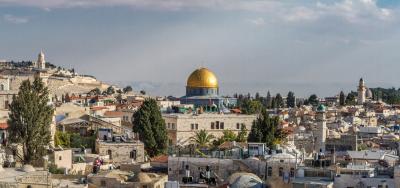
President Trumps statement last night represents a continuation, or potentially culmination, of the Israeli policy of creating ‘facts on the ground’. From the American government, it is an official stamp of approval for the settlement enterprise, considering that East Jerusalem is occupied territory, and a green light for continuing disregard of international law. This brief factsheet will present the legal status of Jerusalem, and a brief analysis of what this declaration means for the future.
Historical Overview
As part of the partition plan of 1947, Resolution 181(II) of the UN General Assembly (GA), Jerusalem was to be an internationally administered zone which did not technically belong to the Palestinian state or the Zionist state. It was to be a shared cultural space, corpus separatum, representing its importance to three Abrhamic religions and internationally.
Following the Zionist occupation of West Jerusalem, and the Jordanian administration of East Jerusalem, steps were quickly taken to assert control over each of the newly taken areas. For the Zionist area, plans were made to move their capital to the part of Jerusalem occupied in 1948. Such plans were finally realized in 1950 with a resolution passed by the Occupation Parliament (the Knesset) on 23 January 1950.
Following the war of 1967, the occupation authorities extended the municipality boundaries to East Jerusalem, and to land from an additional 28 villages. This resulted in an additional 7000 hectares of land coming under Jerusalem municipality and, therefore, direct Israeli legislative control amounting to de facto annexation. This brought tens of thousands of Palestinians under direct legislative control.
On 30 July 1980, the Occupation Parliament passed 'The Jerusalem law'. This law changed little in terms of facts on the ground but formalized the annexation of Jerusalem by including its mention in the Israeli basic law. Much like this law, America’s recognition changes very little in regards to actual control over the city.
The Law
There are two interlocking aspects of international law defining the status of Jerusalem. This is international humanitarian law (IHL), and international practice and norms, as represented in UN General Assembly (GA), Security Council (SC) resolutions, and state policy.
As part of GA Resolution 181(II), Jerusalem was to be governed by a trustee council for the UN. There was to be the appointment of a governor, and the establishment of a legislative council. This international regime never eventuated due to the Jordanian administration and Israeli occupation of the city.
That said, the inability to implement this regime did not result in an international acquiescence in regard to Jerusalem. The lack of recognition of Jerusalem as a unified capital by the majority of states, and their unwillingness to locate their embassies in the city, constituted international practice and norms surrounding its status. This practice, coupled with the opinion juris of the International Court of Justice on the Apartheid Wall, provides a basis for the foundation of a international norm in regard to Jerusalem.
As part of the Israeli occupation, the occupied territory came under the regulation of the Fourth Geneva Convention. As an internationally recognized occupied territory, it is prohibited to annex East Jerusalem under Article 2(4) of the UN charter. Additionally, the extension of legislative control to an occupied territory is prohibited under Article 43 of the Hague Convention, which has the status of international customary law, and Article 64 of the Fourth Geneva Convention. In the case of Jerusalem, the occupying force has used its legislative competence to formalize further policies of forcible transfer of a protected population. Such actions are grave violations of international humanitarian law, and constitute war crimes.
Trump’s Declaration
Trump’s statement regarding recognition, and the movement of the US Embassy does not change the status of Jerusalem. Despite the US’ power, the change of practice of one state is not sufficient to undermine a norm of international law, and is surely not sufficient to negate international humanitarian law.
Thus, the only ramifications of the declaration are political. It represents the true end of any hope of a Palestinian state with territorial continuity, or East Jerusalem as its capital. Most importantly, it is a message. It, combined with Trump’s continued commitment to the ‘peace process’, is meant to communicate to the Palestinian Authority, and people, that the will of the strong is all that matters.